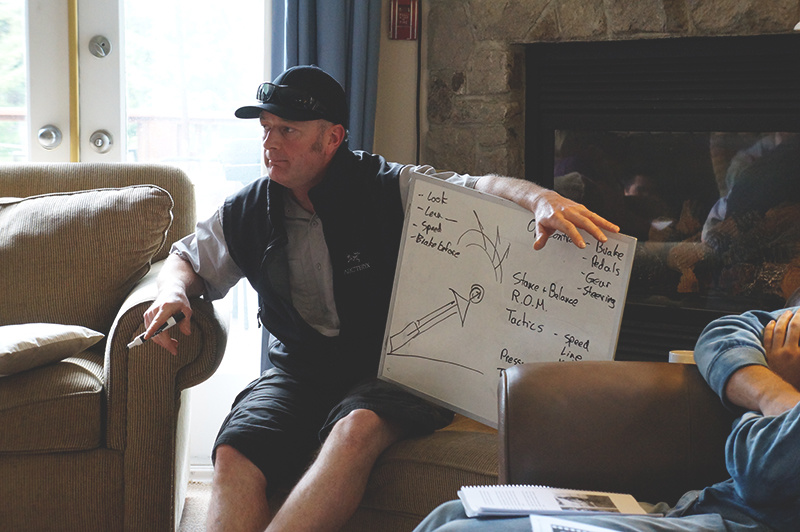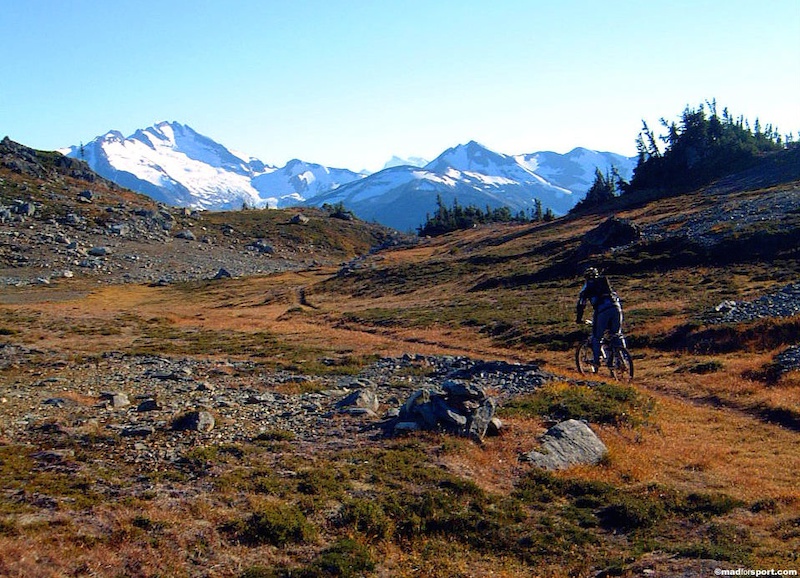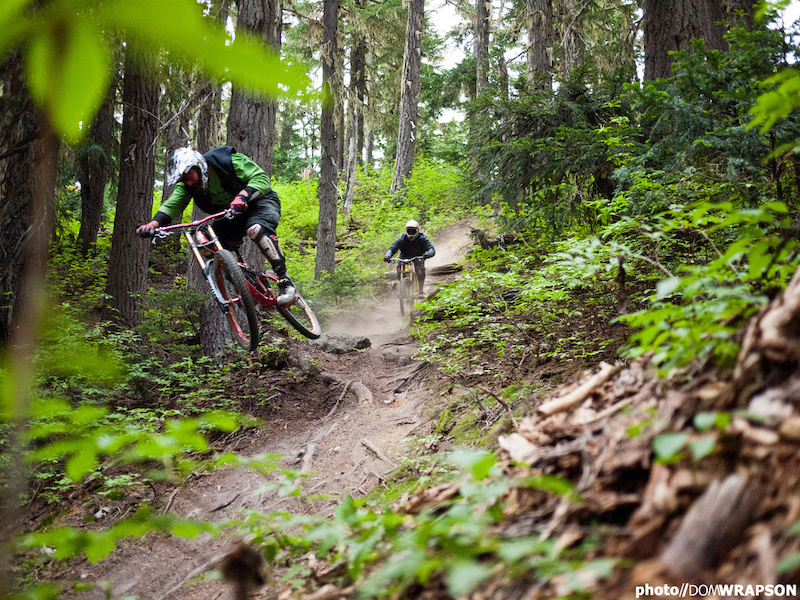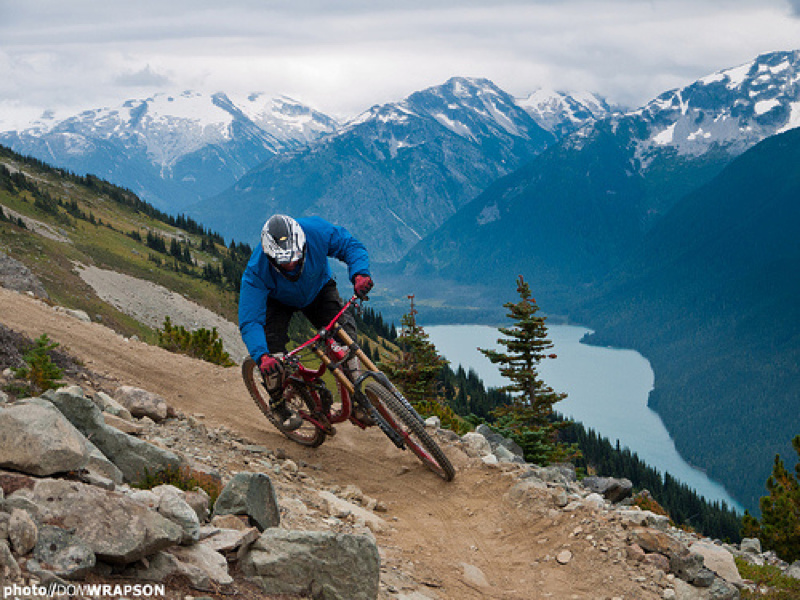Mike Johnstone, bike guide guru of the Whistler Bike Park and co-owner of Terra Method MTB coaching, has to be one of the lesser known lesser known legends in the MTB industry. Mike has been Instrumental in setting up the Bike Park instruction and coaching programs through development of the 'Instructor Development Programme' not only in Whistler, but also (and soon to be) in a whole host of other bike parks. He is also the lead coach on both the MTB courses run by Peak Leaders, offering first class knowledge on teaching DH Mountain Biking for future guides in the industry. We caught up with Mike to talk bikes, his career and what his favourite trail is at the moment.
P: Tell us a little about yourself Mike, where are you from? How long have you been riding bikes?
M: I Grew up North Van, but lived in Kelowna for 5 years. Riding? Well, going back far enough, I managed to snap the head tube off my first bike (complete with training wheels!) riding down a set of stairs aged four! So guess it goes back as far as I remember... I didn't start to ride mountain bikes until '88, since MTBs kinda sucked until then, so I actually started on BMX around '79 when I was 7 or 8 years old. Back in Kelowna we were riding Motocross tracks on our BMXs, so pretty much mountain BMX I guess. I tried a few races, but once my parents saw it was a contact sport they kinda said no more! So that was how I got into the trail riding and jump scene on BMX.

Mike dropping some knowledge
P: How did you get into mountain biking? What was the sport like when you started?
M: When I moved back to North Van from Kelowna, the North Shore scene was just about starting up. I came back in '84, and after seeing what 'Dangerous Dan Cowan' and a bunch of other guys were doing and I ended up trying to do it on BMX! Which was pretty difficult as you'd imagine..
Then in '88 MTBs got much better and I managed to get a hold of one, and loved it! I actually got my first sponsor then from one of the local shops, and got into racing. Firstly with just some beer league races, then into the more serious sanctioned ones. I then moved up the ranks pretty fast but in the early 90s I had a serious car accident whist working as a motorcycle courier which put a stop to my racing. I actually was planning on competing in the World Championships in Bromont since going pro in '89. I don't think I would be where I am in the coaching side of the industry if my racing hadn't stopped then.
In '91, some guys who I raced against asked me to help them out with race tactics. So I ended up coaching them, offering advice on line choice and racing, also wrenching for a bunch of people at the same time. This lead onto me starting teaching kids and youth groups part time in later that year, and then in 96/97 I got my official coaching certification through Canadian cycling. So I then started working for a company called 'Velocity Tours' running tours off Grouse Mountain near Vancouver. I ended up developing the so called 'North Shore Extreme Camps'. teaching how to ride the North Shore (the old wheelie drop days!) and also running basic tours along the sea wall and around Stanley Park.

P: How did you get into the scene in Whistler?
M: After working at Grouse Mountain for two years I then met Tom Radke (Whistler Bike Park Program Supervisor and co-owner of Terra Method) at the level 2 DH certification course in the city. He told me about what was going on at Whistler and said I should come take a look at it. So in the spring of 99 I headed up and once the guys showed me what they had planned, I was in without contest! However, the lack of accommodation up here meant I lived out of my camper in the Parking Lot near the lifts. During that first year I tried working as much as possible, Tom would come grab me when there was work and I set up a few camps and just went about selling myself to take tours up. After that summer, I sold my house in Van and moved up here permanently during the winter.
After that winter, I then start to train all the new staff for the Bike Park being one of the few 'Level 2' coaches around at that time (having done so for Velocity Tours down in Van).
P: How have Mountain Bikes changed in the park since you started?
M:Tons! The first bikes we had were hard tails with front suspension, and the full suspension bikes were just 2/3 inch cross country bikes with V brakes! A little different to the Stinky's us guides were riding... Coming down on the fire road, the tyres would heat up so much you would end up blowing a couple of tubes just on one lap. It was nuts! Since the sport was still so young back then, making financial commitments to high end bikes back then was hard, until it could be proven that the sport would get more popular and expensive tech like disc brakes and stuff could be justified. We'd go down to Interbike in Vegas with all the rental guys and check out all the new tech and decide what would work and what wouldn't.
P: What is your 'weapon of choice' for riding at the moment?
M: The Kona Entourage for sure. It pedals well, but can still be super playful when it wants to! Suits park riding down to the ground.

Mike has some serious bike skill, with plenty of 'steeze' to match!
P: Are you surprised by how big 'Whistler' has become in the MTB world?
M: No I'm not, I knew it would be this big! When we first opened we had a dozen original trails (including Fantastic, After Atlantis, Golden Triangle, Crack Addict, Crab Apple Turns and Crack Addict). And back then we saw people showing up on semi DH bikes like Kona Stinkys and Stabs as well as a few Rocky Mountain RM9s. I was riding a K2 flying monkey (considered a free ride bike at the time!) These bikes really made the trails a lot more fun and it was clear people were putting down more money to buy these kind of bikes, so then it looked set that things were gonna go off.
P: What is your favourite trail in Whistler?
M:Of all? Rip and Rue because it was kinda the first jump trail that we could kinda play with (being great for photos as well). B-Line was good but since racers were ripping down it upsetting the beginners, the park asked them what trail they needed that would keep them off B-line which is how A-line was built!
Regarding the 'newer' trails, Dirt Merchant has to be up there. Just has a nice flow with lots of different features to mix it up. But it depends a lot on my mood to be honest! Its hard to have a favourite given the variety of riding the bike park offers now. More so a favourite of the day! Definitely one of the best things about Whistler, you can really mix up the type of riding you want just on a single lap!
P: Do you have a favourite trails of all time anywhere in the world?
M:There are so many. Khyber's pass is right up there, being really close to the park I still go up and maintain the new entrance into it. Disneyland near Squamish also has to be one of my favourites, being hell dropped onto it was pretty special!
In terms of other bike parks? There is a trail in a Becktail reserve that is not open to the public, which is similar to crank it up (being built by Gravity Logic who built most of the WBP trails) but they made it so you could see the layout of all the features whilst riding down it, meaning you got super comfortable on it straight away, so I could start playing with the trail on the second run! I think this is the future of bike park trails, runs that don't take long to master so you can start playing on them sooner.
But one I will never forget to this day is a mountain down in California (which I can't say where it is since they don't want loads of people riding it), was 10,000 vertical feet (or 5 hours) of descending. More than worth the 12 hour push up.

Railing a corner on 'Top Of The World'
P: How long have you been working with Peak Leaders?
M: 4/5 years
P: And what do you think is the most valuable aspect of the hiring camp?
M:The fact that we cover all off the material in the 3 weeks. Since a lot of the information overlaps, it allows me to play a bit with the schedule so we can use time more efficiently allowing us to give the student so much more information, detail and guidance than we would normally be able to. Especially in regards to the Tech 2, helping the students to understand how they should be thinking when teaching and putting into practice what they have learnt whilst it is fresh in the mind.
P: What aspect of teaching and instructing do you most enjoy?
M: I think probably the 'Aha' moments of beginners or advanced riders. When I start to explain why we move/what is happening with the bikes, and there is that oh lightbulb moment when they start to understand what they are feeling in their own riding and really transfer that to there own prospective students. Teaching is not about this is what I am supposed to say so I am just going to say it, its about understanding what is going on and sharing it with each individual.
P: What have been the most 'game changing' developments in MTB technology since you got into the industry?
M: I think it has to be a top 3! The number one thing that changed how we rode, and what we could ride (especially back in the North Shore days) was better tyres. Even just the increase in size from 2.1s to 2.35s was massive! It was the Kujo and Algato which completely changed what we could do. It meant we could actually do things like stop and slow down on hills!
I think then brake and suspension are a close second and third, especially in regards to teaching and the sport as a whole. Giving a beginner a bike with good brakes meant the could switch there focus, and enjoy riding lots more (rather than having a hard time just slowing down!).
P: Why did you get into coaching?
M: You have been training guides in a number of bike parks in North America, could you see the 'Whistler model' being replicated with more high quality dedicated summer bike parks?
For sure! I've spoken to more bike parks than I can count! I think the idea of the level 1, 2 and 3 staple replicated from the ski world really helps to break down the core skills of mountain biking and make it a more universal.

Mike showing some future guides the ropes on jumping
P: What advice would you give to someone starting in the MTB industry?
M:Definitely figure out where you want to put your focus. there is a lot of different disciplines out there and if you are going to start out instead of trying to be a jack of all trades pick one and become an expert on it and once you have mastered that, then move onto another aspect. Trying to do all is just too much information!
We'd like to thanks Mike for his time to do this interview, if you would like more information about his company Terra- Method, check out his website.
Ski, Snowboard & Mountain Bike Instructor Courses & Camps
www.peakleaders.com | Tel: +44 (0) 1337 860 079
Join us onFacebook | Follow us on Twitter@PeakLeaders





